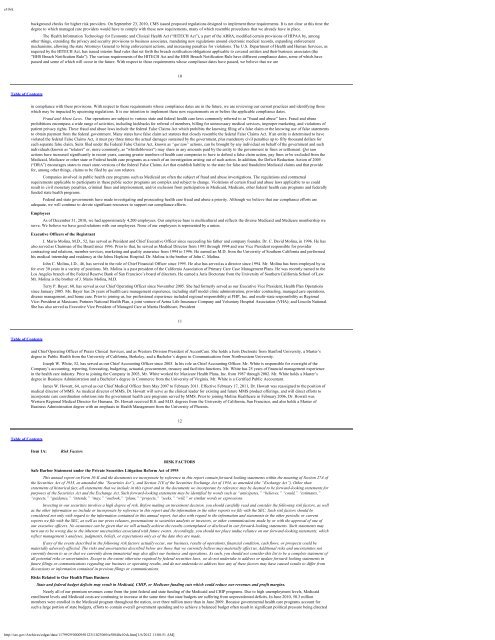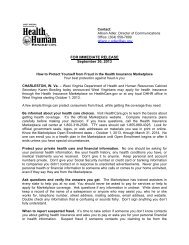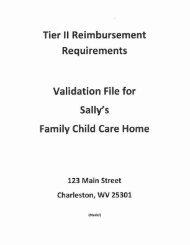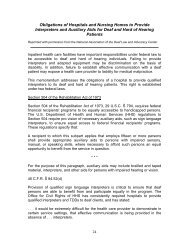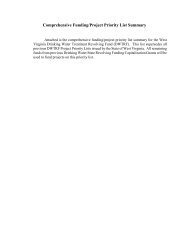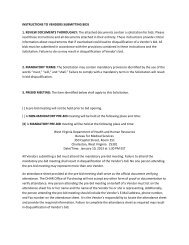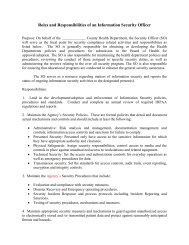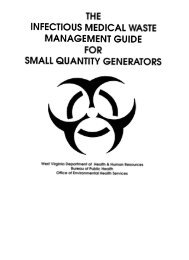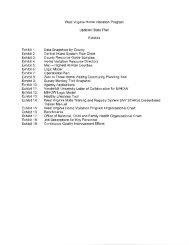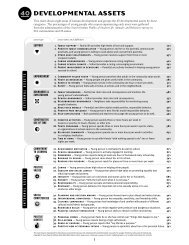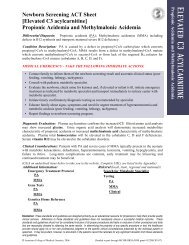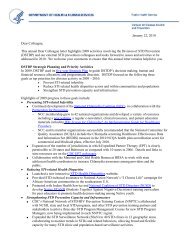Molina Medicaid Solutions - DHHR
Molina Medicaid Solutions - DHHR
Molina Medicaid Solutions - DHHR
You also want an ePaper? Increase the reach of your titles
YUMPU automatically turns print PDFs into web optimized ePapers that Google loves.
e10vkbackground checks for higher risk providers. On September 23, 2010, CMS issued proposed regulations designed to implement these requirements. It is not clear at this time thedegree to which managed care providers would have to comply with these new requirements, many of which resemble procedures that we already have in place.The Health Information Technology for Economic and Clinical Health Act (“HITECH Act”), a part of the ARRA, modified certain provisions of HIPAA by, amongother things, extending the privacy and security provisions to business associates, mandating new regulations around electronic medical records, expanding enforcementmechanisms, allowing the state Attorneys General to bring enforcement actions, and increasing penalties for violations. The U.S. Department of Health and Human Services, asrequired by the HITECH Act, has issued interim final rules that set forth the breach notification obligations applicable to covered entities and their business associates (the“HHS Breach Notification Rule”). The various requirements of the HITECH Act and the HHS Breach Notification Rule have different compliance dates, some of which havepassed and some of which will occur in the future. With respect to those requirements whose compliance dates have passed, we believe that we are10Table of Contentsin compliance with these provisions. With respect to those requirements whose compliance dates are in the future, we are reviewing our current practices and identifying thosewhich may be impacted by upcoming regulations. It is our intention to implement these new requirements on or before the applicable compliance dates.Fraud and Abuse Laws. Our operations are subject to various state and federal health care laws commonly referred to as “fraud and abuse” laws. Fraud and abuseprohibitions encompass a wide range of activities, including kickbacks for referral of members, billing for unnecessary medical services, improper marketing, and violations ofpatient privacy rights. These fraud and abuse laws include the federal False Claims Act which prohibits the knowing filing of a false claim or the knowing use of false statementsto obtain payment from the federal government. Many states have false claim act statutes that closely resemble the federal False Claims Act. If an entity is determined to haveviolated the federal False Claims Act, it must pay three times the actual damages sustained by the government, plus mandatory civil penalties up to fifty thousand dollars foreach separate false claim. Suits filed under the Federal False Claims Act, known as “qui tam” actions, can be brought by any individual on behalf of the government and suchindividuals (known as “relators” or, more commonly, as “whistleblowers”) may share in any amounts paid by the entity to the government in fines or settlement. Qui tamactions have increased significantly in recent years, causing greater numbers of health care companies to have to defend a false claim action, pay fines or be excluded from the<strong>Medicaid</strong>, Medicare or other state or Federal health care programs as a result of an investigation arising out of such action. In addition, the Deficit Reduction Action of 2005(“DRA”) encourages states to enact state-versions of the federal False Claims Act that establish liability to the state for false and fraudulent <strong>Medicaid</strong> claims and that providefor, among other things, claims to be filed by qui tam relators.Companies involved in public health care programs such as <strong>Medicaid</strong> are often the subject of fraud and abuse investigations. The regulations and contractualrequirements applicable to participants in these public sector programs are complex and subject to change. Violations of certain fraud and abuse laws applicable to us couldresult in civil monetary penalties, criminal fines and imprisonment, and/or exclusion from participation in <strong>Medicaid</strong>, Medicare, other federal health care programs and federallyfunded state health programs.Federal and state governments have made investigating and prosecuting health care fraud and abuse a priority. Although we believe that our compliance efforts areadequate, we will continue to devote significant resources to support our compliance efforts.EmployeesAs of December 31, 2010, we had approximately 4,200 employees. Our employee base is multicultural and reflects the diverse <strong>Medicaid</strong> and Medicare membership weserve. We believe we have good relations with our employees. None of our employees is represented by a union.Executive Officers of the RegistrantJ. Mario <strong>Molina</strong>, M.D., 52, has served as President and Chief Executive Officer since succeeding his father and company founder, Dr. C. David <strong>Molina</strong>, in 1996. He hasalso served as Chairman of the Board since 1996. Prior to that, he served as Medical Director from 1991 through 1994 and was Vice President responsible for providercontracting and relations, member services, marketing and quality assurance from 1994 to 1996. He earned an M.D. from the University of Southern California and performedhis medical internship and residency at the Johns Hopkins Hospital. Dr. <strong>Molina</strong> is the brother of John C. <strong>Molina</strong>.John C. <strong>Molina</strong>, J.D., 46, has served in the role of Chief Financial Officer since 1995. He also has served as a director since 1994. Mr. <strong>Molina</strong> has been employed by usfor over 30 years in a variety of positions. Mr. <strong>Molina</strong> is a past president of the California Association of Primary Care Case Management Plans. He was recently named to theLos Angeles branch of the Federal Reserve Bank of San Francisco’s board of directors. He earned a Juris Doctorate from the University of Southern California School of Law.Mr. <strong>Molina</strong> is the brother of J. Mario <strong>Molina</strong>, M.D.Terry P. Bayer, 60, has served as our Chief Operating Officer since November 2005. She had formerly served as our Executive Vice President, Health Plan Operationssince January 2005. Ms. Bayer has 26 years of health care management experience, including staff model clinic administration, provider contracting, managed care operations,disease management, and home care. Prior to joining us, her professional experience included regional responsibility at FHP, Inc. and multi-state responsibility as RegionalVice-President at Maxicare; Partners National Health Plan, a joint venture of Aetna Life Insurance Company and Voluntary Hospital Association (VHA); and Lincoln National.She has also served as Executive Vice President of Managed Care at Matria Healthcare, President11Table of Contentsand Chief Operating Officer of Praxis Clinical Services, and as Western Division President of AccentCare. She holds a Juris Doctorate from Stanford University, a Master’sdegree in Public Health from the University of California, Berkeley, and a Bachelor’s degree in Communications from Northwestern University.Joseph W. White, 52, has served as our Chief Accounting Officer since 2003. In his role as Chief Accounting Officer, Mr. White is responsible for oversight of theCompany’s accounting, reporting, forecasting, budgeting, actuarial, procurement, treasury and facilities functions. Mr. White has 25 years of financial management experiencein the health care industry. Prior to joining the Company in 2003, Mr. White worked for Maxicare Health Plans, Inc. from 1987 through 2002. Mr. White holds a Master’sdegree in Business Administration and a Bachelor’s degree in Commerce from the University of Virginia. Mr. White is a Certified Public Accountant.James W. Howatt, 64, served as our Chief Medical Officer from May 2007 to February 2011. Effective February 17, 2011, Dr. Howatt was reassigned to the position ofmedical director of MMS. As medical director of MMS, Dr. Howatt will serve as the clinical leader for existing and future MMS product offerings, and will direct efforts toincorporate care coordination solutions into the government health care programs served by MMS. Prior to joining <strong>Molina</strong> Healthcare in February 2006, Dr. Howatt wasWestern Regional Medical Director for Humana. Dr. Howatt received B.S. and M.D. degrees from the University of California, San Francisco, and also holds a Master ofBusiness Administration degree with an emphasis in Health Management from the University of Phoenix.12Table of ContentsItem 1A:Risk FactorsRISK FACTORSSafe Harbor Statement under the Private Securities Litigation Reform Act of 1995This annual report on Form 10-K and the documents we incorporate by reference in this report contain forward-looking statements within the meaning of Section 27A ofthe Securities Act of 1933, as amended (the “Securities Act”), and Section 21E of the Securities Exchange Act of 1934, as amended (the “Exchange Act”). Other thanstatements of historical fact, all statements that we include in this report and in the documents we incorporate by reference may be deemed to be forward-looking statements forpurposes of the Securities Act and the Exchange Act. Such forward-looking statements may be identified by words such as “anticipates,” “believes,” “could,” “estimates,”“expects,” “guidance,” “intends,” “may,” “outlook,” “plans,” “projects,” “seeks,” “will,” or similar words or expressions.Investing in our securities involves a high degree of risk. Before making an investment decision, you should carefully read and consider the following risk factors, as wellas the other information we include or incorporate by reference in this report and the information in the other reports we file with the SEC. Such risk factors should beconsidered not only with regard to the information contained in this annual report, but also with regard to the information and statements in the other periodic or currentreports we file with the SEC, as well as our press releases, presentations to securities analysts or investors, or other communications made by or with the approval of one ofour executive officers. No assurance can be given that we will actually achieve the results contemplated or disclosed in our forward-looking statements. Such statements mayturn out to be wrong due to the inherent uncertainties associated with future events. Accordingly, you should not place undue reliance on our forward-looking statements, whichreflect management’s analyses, judgments, beliefs, or expectations only as of the date they are made.If any of the events described in the following risk factors actually occur, our business, results of operations, financial condition, cash flows, or prospects could bematerially adversely affected. The risks and uncertainties described below are those that we currently believe may materially affect us. Additional risks and uncertainties notcurrently known to us or that we currently deem immaterial may also affect our business and operations. As such, you should not consider this list to be a complete statement ofall potential risks or uncertainties. Except to the extent otherwise required by federal securities laws, we do not undertake to address or update forward-looking statements infuture filings or communications regarding our business or operating results, and do not undertake to address how any of these factors may have caused results to differ fromdiscussions or information contained in previous filings or communications.Risks Related to Our Health Plans BusinessState and federal budget deficits may result in <strong>Medicaid</strong>, CHIP, or Medicare funding cuts which could reduce our revenues and profit margins.Nearly all of our premium revenues come from the joint federal and state funding of the <strong>Medicaid</strong> and CHIP programs. Due to high unemployment levels, <strong>Medicaid</strong>enrollment levels and <strong>Medicaid</strong> costs are continuing to increase at the same time that state budgets are suffering from unprecedented deficits. In June 2010, 50.3 millionmembers were enrolled in the <strong>Medicaid</strong> program throughout the nation, over three million more than in June 2009. Because governmental health care programs account forsuch a large portion of state budgets, efforts to contain overall government spending and to achieve a balanced budget often result in significant political pressure being directedhttp://sec.gov/Archives/edgar/data/1179929/000095012311023069/a58840e10vk.htm[1/6/2012 11:08:51 AM]


